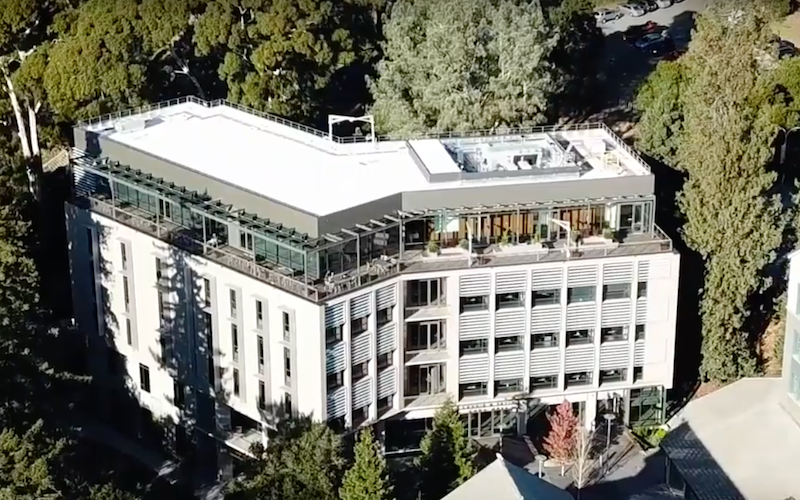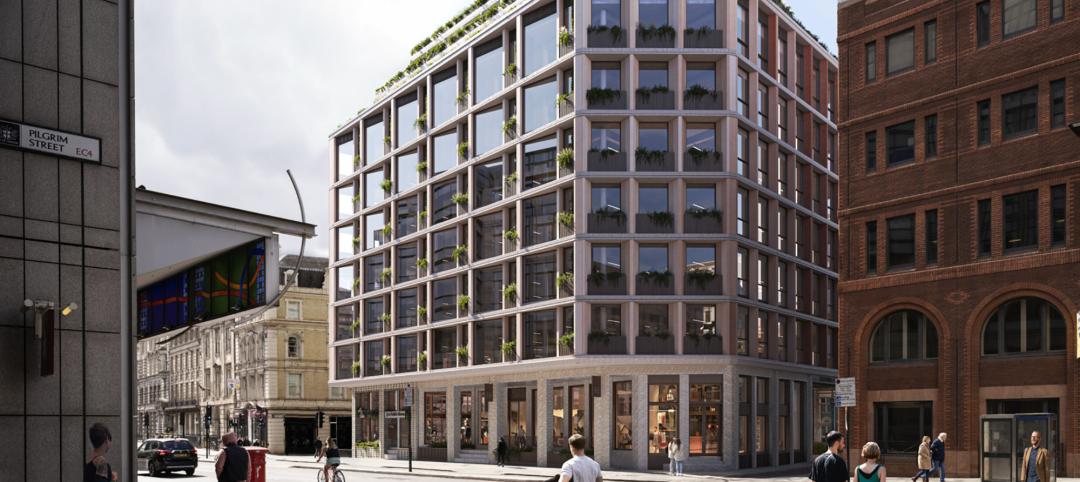According to the University of California, Berkeley, Chou Hall, part of the Haas School of Business, has become the greenest academic building in the country thanks to its TRUE Platinum Zero Waste certification at the highest level and a LEED Platinum certification. Chou Hall is the only academic building in the country to achieve TRUE Platinum. To achieve TRUE Platinum, the Chou team earned 69 out of the 70 credits they applied for.
The six-story, 80,000-sf building, designed by Perkins+Will and opened in August 2017, earned the TRUE Platinum Zero Waste certification after more than a year of waste sorting, composting, and other concentrated efforts to divert over 90% of Chou’s landfill waste. Design features such as rainwater harvesting, water-efficient landscaping, and the use of water-saving toilets and bathroom fixtures, help Chou Hall use 40% less water than a traditional building of its size and purpose. Energy efficiency was improved by 38% over traditional buildings through solar shading, high-performance windows, a reflective roof, daylight controlled LED lighting, and cooling fans and pumps controlled by adjustable-speed drives.
See Also: Ontario building first to achieve zero-carbon designation by Canada GBC
The facility includes eight tiered classrooms with 76-140 seats each, a 300 person event space, a 3,000-sf cafe with outdoor seating, 28 study rooms, four flexible classrooms, and a total of 858 classroom seats.
In addition to Perkins+Will, Vance Brown Builders was the project’s general contractor.
Related Stories
Green | Aug 7, 2023
Rooftop photovoltaic panels credited with propelling solar energy output to record high
Solar provided a record-high 7.3% of U.S. electrical generation in May, “driven in large part by growth in ‘estimated’ small-scale (e.g., rooftop) solar PV whose output increased by 25.6% and accounted for nearly a third (31.9%) of total solar production,” according to a report by the U.S. Energy Information Administration.
Resiliency | Aug 7, 2023
Creative ways cities are seeking to beat urban heat gain
As temperatures in many areas hit record highs this summer, cities around the world are turning to creative solutions to cope with the heat. Here are several creative ways cities are seeking to beat urban heat gain.
Government Buildings | Aug 7, 2023
Nearly $1 billion earmarked for energy efficiency upgrades to federal buildings
The U.S. General Services Administration (GSA) recently announced plans to use $975 million in Inflation Reduction Act funding for energy efficiency and clean energy upgrades to federal buildings across the country. The investment will impact about 40 million sf, or about 20% of GSA’s federal buildings portfolio.
Codes and Standards | Aug 7, 2023
Cambridge, Mass., requires net-zero emissions for some large buildings by 2035
The City of Cambridge, Mass., recently mandated that all non-residential buildings—including existing structures—larger than 100,000 sf meet a net-zero emissions requirement by 2035.
Multifamily Housing | Jul 31, 2023
6 multifamily housing projects win 2023 LEED Homes Awards
The 2023 LEED Homes Awards winners in the multifamily space represent green, LEED-certified buildings designed to provide clean indoor air and reduced energy consumption.
Sustainability | Jul 27, 2023
USGBC warns against building energy code preemptions, rollbacks
In a recent editorial, the USGBC cited a growing number of U.S. state legislators who are “aiming to roll back building energy code standards and/or preempt local governments from advancing energy-efficient building codes.”
Resiliency | Jul 27, 2023
'Underground climate change' can damage building foundations, civil infrastructure
A phenomenon known as “underground climate change” can lead to damage of building foundations and civil infrastructure, according to a researcher at Northwestern University. When the ground gets hotter, it can expand and contract, causing foundations to move and sometimes crack.
Sustainability | Jul 19, 2023
California lawmakers approve governor’s plan to accelerate green construction
California lawmakers recently approved Gov. Gavin Newsom’s infrastructure streamlining plan that aims to accelerate clean energy and infrastructure projects.
Sustainability | Jul 13, 2023
Deep green retrofits: Updating old buildings to new sustainability standards
HOK’s David Weatherhead and Atenor’s Eoin Conroy discuss the challenges and opportunities of refurbishing old buildings to meet modern-day sustainability standards.
Mass Timber | Jul 11, 2023
5 solutions to acoustic issues in mass timber buildings
For all its advantages, mass timber also has a less-heralded quality: its acoustic challenges. Exposed wood ceilings and floors have led to issues with excessive noise. Mass timber experts offer practical solutions to the top five acoustic issues in mass timber buildings.

















